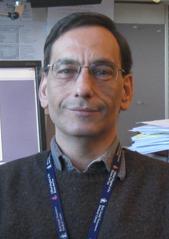
Name: Peter H. Lapchak
Title: Instructor in Medicine
Institution: Beth Israel Deaconess Medical Center/Harvard Medical School
Clinical Specialty: N/A
Research Interest: Immunology, Inflammation, Injury/trauma, Sepsis, Platelet Immunobiology
Current Area of Study Immune role of platelets in local and remote tissue damage after ischemia/reperfusion
Webpage: http://www.bidmc.org/Research/Departments/Medicine/Divisions/Rheumatology/TsokosLab.aspx
Institution during SIS Fellowship: Brigham and Women's Hospital
SIS Fellowship Mentor: Dr. John Mannick
SIS Fellowshp Project Title: First year: The Effects of Platelets on the Host Response to Injury; Second year: Immune-Modulation of the Host Response to Injury by Platelets
Fellowship Years: 2005-2006
Fellowship Publication:
- Fujimi, S., MP. MacConmara, AA. Maung, Y. Zang, JA. Mannick, JA. Lederer, and PH. Lapchak. (2006) Platelet depletion in mice increases mortality after thermal injury. Blood 107(11): 4399-4406.
How did you hear about the SIS Fellowship? I heard about the opportunity from my supervisor, Dr. Jim Lederer. He suggested it was a great way to start on my path to independent study.
Who was the main influence on your choice to become an basic science researcher? How did you decide on this career path? Tough question. There were no direct influences from my family. In high school biology was fun, easy and interesting. The lab experience “hooked” me and the rest is history. I wanted to work in a lab. Further into my education, I decided that research was a way to challenge myself on a daily basis. Where else could you work and at the end of the day, have a feeling that you learned something new or feel that you accomplished something important?
How did you get involved in surgical infections research? My specific area of research concerns sepsis, which occurs sometimes as a consequence of traumatic injury. Understanding how sepsis manipulates the immune response is one important aspect in prevention in order to reduce morbidity and mortality. Platelets as an immune cell are one of the cell types least often studied. Sepsis affects platelets just like other immune cells. Clinically, trauma or septic patients that have a recurring chronic thrombocytopenia have a poor outcome. Having the exposure to the great clinical minds at the SIS helps guide how I think about clinical importance of my basic science work. Being exposed to the different areas of study that are presented at the annual meetings also helps me think about the clinical benefits of what I do.
Can you describe how the fellowship helped your career? The Fellowship allowed me to establish a role for platelets in the host response to traumatic injury not only in burn injury but now extended to other forms of traumatic injury such as ischemia/reperfusion. I am forever indebted to the members of the SIS for their faith and belief in me.
Have you continued this line of research? Yes. I have applied knowledge and data from a burn injury model to an ischemia/reperfusion model.
Did you obtain further research funding in this area? Yes, Department of Defense funding based on both burn injury and ischemia/reperfusion injury.
What would you tell medical students who are interested in basic science research? Research, whether basic science or clinical studies, is a great way to open your minds to new and innovative ideas. Having this background will make a better clinician.
What suggestions would you give to residents who would like to pursue research projects? Know what you want to do, and give yourself a time line to complete each phase. Ask simple questions that can be addressed.
What about obtaining funding? Look for start up funding/fellowships/junior faculty awards to allow you to develop your line of study. Work in an open-minded atmosphere and have great support from your immediate supervisors.
How did you first get involved in the Surgical Infection Society? I joined as a trainee member upon suggestion from Dr. Lederer and Dr. Mannick. I have been a member ever since and am actively involved in the Society.
Why should young investigators get involved with SIS? It is a great society that brings basic science and clinical investigation together.